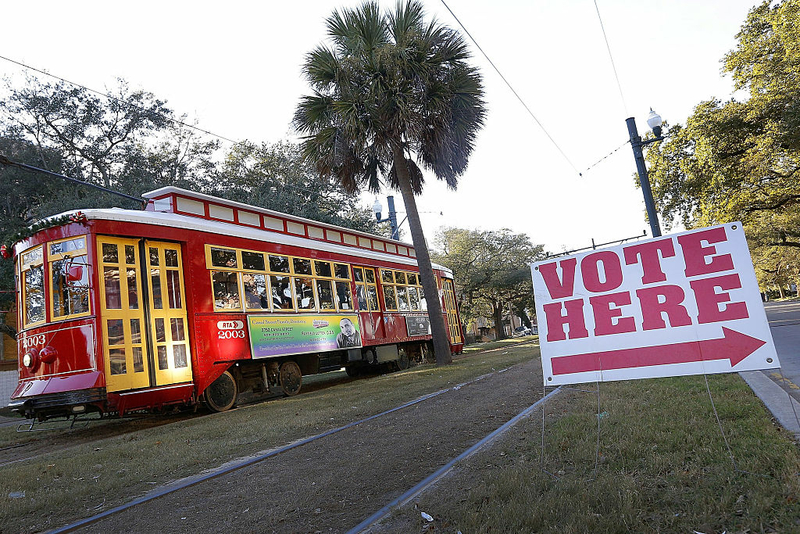CABL opposes 4 constitutional amendments on Louisiana’s November ballot

The nonpartisan good government Council for a Better Louisiana (CABL) issued its recommendations Thursday for the eight amendments to the state constitution on the Nov. 8 ballot, and the group opposes half of them, including a proposal to officially make slavery and forced labor illegal.
CABL supports two of the proposed changes and took no position on two others that have significant property tax implications.
Oppose
Amendment No. 3 would apply to civil service employees in the state system and equivalents in New Orleans, Opelousas and Plaquemines Parish. If approved, it allows “an immediate family member” who is a civil service employee to take part in a relative’s political campaign – an activity currently banned under state law.
Supporters say candidates should be allowed to have their family included in photos for campaign literature and attend campaign events. They see the restriction as an encumbrance on First Amendment rights.
CABL argues the definition of “immediate family member” for the proposal is very broad. The list accompanying the legislation that created Amendment No. 3 includes 21 different relatives.
“I is interesting to note, that while this amendment opens participation in political activities to a broad group of classified civil servants, it specifically excludes employees of the Registrars of Voters and the state Elections Division,” CABL said in its opinion. “If we don’t want them to get involved in politics, why would we want their colleagues in other agencies to be allowed to?”
Amendment No. 4 would allow publicly owned utilities to waive exorbitant water or sewer bills if problems with the utility led to the overbilling. Currently, these bills can’t simply be discarded because state law prohibits government entities from giving away anything of value.
Proponents of the amendment, including the Louisiana Municipal Association, note that other states allow their utilities to toss these bills.
CABL favors a more targeted approach to the problem, fearing that the amendment would create a “slippery slope” that could leave rural water systems financially vulnerable.
Amendment No. 7 would eliminate an exception in the state constitution that allows involuntary servitude as punishment for a crime and officially outlaw slavery.
But CABL believes there’s enough uncertainty in the language of the proposal that its purpose would be defeated if approved.
“Our current constitution says that ‘Slavery and involuntary servitude are prohibited, except in the latter case as punishment for a crime,’” the CABL overview explains. “Compare that with the wording of this amendment: ‘Slavery and involuntary servitude are prohibited, (but this) does not apply to the otherwise lawful administration of criminal justice.’
“This wording may seem nuanced, but technically it can be read to permit both slavery and involuntary servitude in a certain circumstance where the current constitution says that slavery is explicitly prohibited.”
CABL suggests lawmakers take the time to get the language right, although that suggestion is moot if the amendment is approved. Even then, the group says nothing will change.
Amendment No. 8 would end the requirement that disabled property owners have to certify their income annually in order to receive a tax break.
Supporters want people who are totally disabled to enjoy the same benefit that homeowners 65 and older receive.
CABL contends certification is not a difficult process, and eliminating it for select taxpayers makes an improper assumption.
“We sometimes forget that disability does not necessarily correlate to household income,” according to CABL. “If it did, that would assume that a person with a disability, even though serious, could never work or earn a good salary. And presumably, the same would be true of their spouse. That’s simply not the case.”
8 proposed amendments to the Louisiana Constitution: What you need to know
Support
Amendment No. 1 increases the investment caps on certain state funds from 35% to 65%. Currently, the treasurer has to divest from equities once the funds hit that cap, even if it means forgoing additional profits.
CABL feels the potential upside offsets any volatility over the long haul.
“While financial markets of all varieties are in a state of flux at this moment, investments for permanent funds such as these suggest a long-term strategy where greater access to the stock market seems appropriate,” its overview concludes.
Amendment 5 would allow local taxing bodies to delay increases in the property tax millage rates. Currently, they have to collect the maximum millage at some point before property values are reassessed every four years if they intend to renew the tax at the same rate once it expires. For property owners, it could result in tax bill shock.
The amendment would do away with this maximum requirement, providing property owners with more stability in the taxes they owe. Taxing bodies would also avoid being accused of padding their revenue.
No position
Amendment 2 provides additional property tax exemptions to disabled veterans. If approved, the break that currently applies only to 100% disabled veterans would be adjusted in staggered amounts depending on the severity of a veteran’s disability. The whole tax waiver would continue to be one of the options.
CABL has historically opposed constitutional amendments that take away from local tax collections, but it’s making an exception with this proposal.
Amendment 6 limits how much the Orleans Parish assessor can increase property values. Short-term rental investments have led to a surge in home values in some neighborhoods, which has caused property tax all around them to soar exponentially. This proposal would limit increases to 10% annually.
CABL acknowledge housing prices are rising throughout the city and questions whether the amendment is the best approach to curbing huge property tax bills.
“The bottom line is that this does seem to be a significant problem in some areas of New Orleans. Housing is a major issue in cities across the country which are struggling to keep people in their homes and make housing as affordable as possible. At this tenuous time for the economy, no one wants to exacerbate that situation.”








